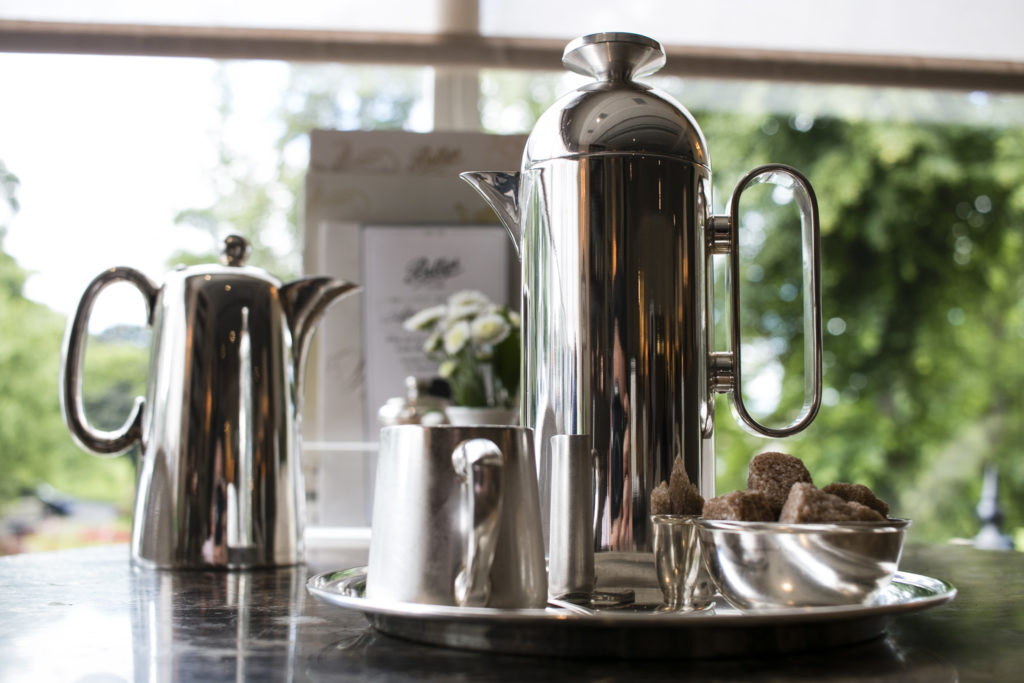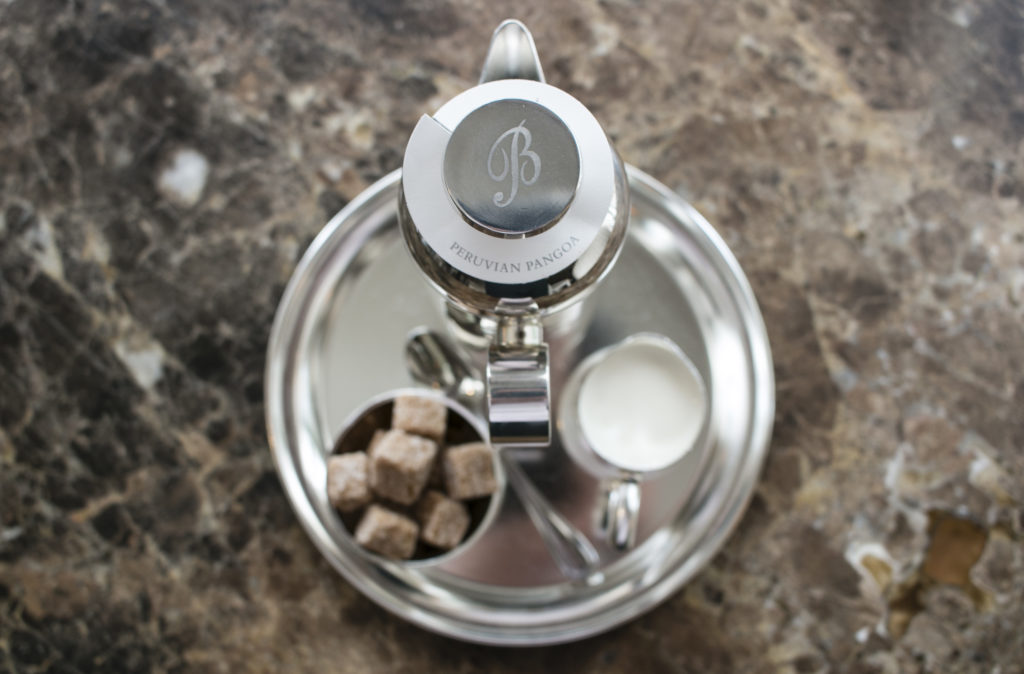Design for life: how Corin Mellor designed a new cafetiere for Bettys
 Cafés don’t ordinarily contain fully functioning traffic lights flashing from green to amber to red. Ours certainly don’t. But this one does. I try not to look confused. There are lots of regulars here enjoying tea and homemade cake. I don’t want to look like a tourist – I act natural and scan for an explanation.
Cafés don’t ordinarily contain fully functioning traffic lights flashing from green to amber to red. Ours certainly don’t. But this one does. I try not to look confused. There are lots of regulars here enjoying tea and homemade cake. I don’t want to look like a tourist – I act natural and scan for an explanation.I find it on a neat little board – the kind that museums have: “David Mellor’s redesign of the traffic lights remains his greatest contribution to Britain’s street scene. His traffic lights are still in use, basically unaltered since their introduction half a century ago.”
I look at the yellow control box. How many times have I pressed one of those buttons to illuminate the word ‘WAIT’? Thousands? David Mellor designed that. And now his son, Corin, displaying his father’s appetite for variety, has designed our new cafetiere.

A Hathersage home
If you ever find yourself even within the striking distance of Hathersage, I urge you to visit David Mellor Design. Occupying the site of a former gasworks, the Mellor family relocated the business there from Sheffield in the late 80s and set about creating a new home. Literally – Corin and his wife, Helen, live in a house linked to the café and offices via a glass walkway.
The centrepiece of the site is the factory, known as the Round Building, which was designed by Sir Michael Hopkins. Guided tours are conducted on Saturdays and Sundays.
Behind that sits the shop, an adjoining building which contains their rapidly expanding mail order business and the café. As well as the traffic lights, the café houses a permanent collection of classic pieces from the David Mellor archive, many of which are cutlery ranges. Cutlery and traffic lights – it’s an unusual combination.
Humble roots
“My father had humble Sheffield roots but somehow managed to elevate himself to the Royal College of Art where he studied silversmithing,” explains Corin Mellor, David’s son. David Mellor passed away in 2009, and Corin is now Creative Director of the family business. “There he designed his first set of cutlery called Pride. That was the first student design to be taken up by a manufacturer and put into production.”
Energised by this early success, David returned to Sheffield, where he really started to develop his passion for getting good design to the masses. He won government commissions, designing cutlery for prisons and hospitals. Alongside this, and in complete contrast, he produced a bespoke range for British embassies and opened a shop in Sloane Square, retailing designer pieces to the beau monde of swinging 60s London.
He also started working with a company that produced street furniture, designing bus shelters, litter bins, bollards and streetlamps. These were so successful that he won a commission to redesign Britain’s street signalling – changing the face of our nation’s roads forever.

Like father, like son
Corin Mellor grew up surrounded by this restless creativity. Their house in Sheffield was part family home, part metalworking factory, and it wasn't only his father who made things: his mum, Fiona MacCarthy, is a renowned biographer and cultural historian. Corin had his own career as a product designer and architect before taking over the running of the family business in 2006. His desire is that the company remains “small and special” and with his colleague, James Nicholls, he continues to associate the David Mellor name with a diverse mixture of design projects.
“If you’re a designer you can use the same design process to design anything. We did a bridge this year for Sheffield Hallam University and we’ve just done a funny little job for John Smedley, designing some lights for their shop on Jermyn Street. Or there’s your cafetiere.”
In many ways our cafetiere was a brief ideally suited to their ways of working. Corin describes the purpose of their business being to design “special things that will endure time”. When Bettys’ Creative Manager, Georgina O’Connor, sought them out for this project that was very much what she had in mind. She hosted the first meeting at Bettys in Harrogate, and brought a silver coffee pot from our archive to provide inspiration.
Corin made some quick sketches but very early on took the idea into the factory to make up a solid aluminium prototype. We still have this at our Craft Bakery in Harrogate – a heavy metal block which is nonetheless unmistakably our cafetiere.
“When you prototype in the factory, and you file out the details, you get the subtlety, whereas when you design straight into the computer you tend to lose something. All the bits add up.”

For Corin, this process is particularly good at revealing the things you need to change. For example, the handle was moved up – just a fraction but enough to bring it above the rim of the jug. It seems counterintuitive, but when you hold the finished cafetiere, it feels just right.
“I like the idea of designing products that aren't part of trends or fads, that have a visual lifespan. I wanted to design something that would retain its character in 20 years time. I was trying to combine something classical with modernism, to find a balance between the two – it’s slightly quirky, but it fits.”
He holds it up to the light and considers it again. “I think I got it right”, he says happily.
As he walks me to my car we pass a letterbox, a bench and a bus stop, located, surreally, nowhere near a road – more pieces from the remarkable David Mellor archive. Corin nods towards them and says, with a wry smile: “Just the other day I heard someone ask what time the bus comes.”
Visit one of our six Yorkshire Café Tea Rooms to enjoy freshly brewed coffee from a cafetiere by David Mellor Design
Little Mesters
‘Little mesters’ or ‘little masters’ played an important role in the development of cutlery making in Sheffield. They were self-employed craftsmen who would either rent space in a factory or work from their own workshop, and each would have a specialism relating to the industry such as forging, grinding or polishing. You could produce your own range of cutlery without a factory, simply by passing your pieces from one little mester to another. Though there are far fewer than there once were, the tradition is alive to this day; in fact our cafetiere was silver plated by a little mester who has worked with David Mellor Design since he was a young apprentice.


